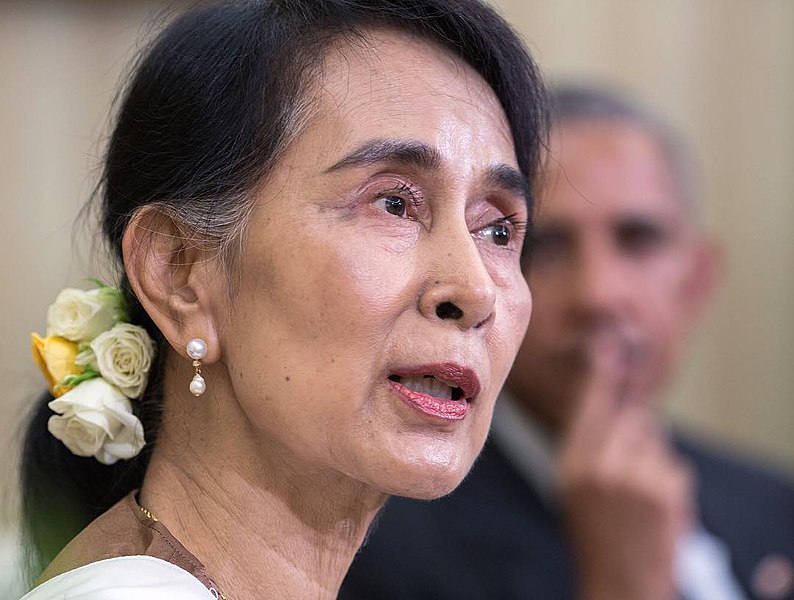Myanmar’s military junta has sought to press criminal charges on the country’s ousted leader Aung San Suu Kyi, who remains detained. The junta court this week postponed its verdict on the Nobel laureate’s corruption trial.
A spokesperson for the junta, Zaw Min Tun, told AFP that the verdict on the trial for Aung San Suu Kyi which is expected to be announced this week would be postponed. The spokesperson did not disclose the reason for the postponement as well as when the verdict was now set to be announced.
Journalists were not allowed to attend the special hearings in the military-established capital Naypyidaw and the ousted leader’s lawyers were not allowed to speak to the media. The corruption trial centers on the accusation that Aung San Suu Kyi accepted bribes of $600,000 in cash and gold bars from the former chief minister of Yangon.
Aung San Suu Kyi and officials of Myanmar’s democratically elected government were ousted in February 2021 when the military generals seized power. The military also engaged in a brutal crackdown on the citizens who have opposed the coup, killing over 1,000 people and detaining thousands more among other actions.
Aung San Suu Kyi is facing 10 corruption charges, each charge would have a 15-year maximum prison sentence. The ousted leader is also accused of breaching the official secrets act alongside Australian economic policy adviser Sean Turnell, who is also detained by the junta.
Aung San Suu Kyi is already sentenced to six years in prison for incitement against the military and breaching COVID-19 protocols as well as violating a telecommunications law.
Early this month, the junta announced its granting of amnesty to hundreds of prisoners as the country marks its New Year tradition. However, no political prisoners were among those who were released to their loved ones despite the military junta’s pledge to restore peace this year.
The foreign prisoners that are granted amnesty would be deported from the country, according to Lieutenant General Aung Din Lwe, and a prisons official said that most of the prisoners who were released were drug offenders and those who committed petty crimes.



 UK Accepts U.S. Request to Use British Bases for Defensive Strikes on Iranian Missiles
UK Accepts U.S. Request to Use British Bases for Defensive Strikes on Iranian Missiles  EU Urges Maximum Restraint in Iran Conflict Amid Fears of Regional Escalation and Oil Supply Disruption
EU Urges Maximum Restraint in Iran Conflict Amid Fears of Regional Escalation and Oil Supply Disruption  Iran Supreme Leader Ayatollah Ali Khamenei Killed in Israeli, U.S. Strikes: Reuters
Iran Supreme Leader Ayatollah Ali Khamenei Killed in Israeli, U.S. Strikes: Reuters  Argentina Tax Reform 2026: President Javier Milei Pushes Lower Taxes and Structural Changes
Argentina Tax Reform 2026: President Javier Milei Pushes Lower Taxes and Structural Changes  Zelenskiy Urges Change in Iran After U.S. and Israeli Strikes, Cites Drone Support for Russia
Zelenskiy Urges Change in Iran After U.S. and Israeli Strikes, Cites Drone Support for Russia  Marco Rubio to Brief Congress After U.S.-Israeli Strikes on Iran
Marco Rubio to Brief Congress After U.S.-Israeli Strikes on Iran  Trump Launches Operation Epic Fury: U.S. Strikes on Iran Mark High-Risk Shift in Middle East
Trump Launches Operation Epic Fury: U.S. Strikes on Iran Mark High-Risk Shift in Middle East  Israel Declares State of Emergency as Iran Launches Missile Attacks
Israel Declares State of Emergency as Iran Launches Missile Attacks  Trump Says U.S. Combat Operations in Iran Will Continue Until Objectives Are Met
Trump Says U.S. Combat Operations in Iran Will Continue Until Objectives Are Met  Trump Floats “Friendly Takeover” of Cuba as Rubio Reportedly Engages in Talks
Trump Floats “Friendly Takeover” of Cuba as Rubio Reportedly Engages in Talks  Australian PM Calls Alleged Western Australia Terror Plot “Deeply Shocking” After Arrest
Australian PM Calls Alleged Western Australia Terror Plot “Deeply Shocking” After Arrest  Trump Warns Iran as Gulf Conflict Disrupts Oil Markets and Global Trade
Trump Warns Iran as Gulf Conflict Disrupts Oil Markets and Global Trade  Netanyahu Suggests Iran’s Supreme Leader Khamenei May Have Been Killed in Israeli-U.S. Strikes
Netanyahu Suggests Iran’s Supreme Leader Khamenei May Have Been Killed in Israeli-U.S. Strikes  Trump Announces U.S. Strikes on Iran Navy as Conflict Escalates
Trump Announces U.S. Strikes on Iran Navy as Conflict Escalates  U.S. Deploys Tomahawks, B-2 Bombers, F-35 Jets and AI Tools in Operation Epic Fury Against Iran
U.S. Deploys Tomahawks, B-2 Bombers, F-35 Jets and AI Tools in Operation Epic Fury Against Iran  Macron Urges Emergency UN Security Council Meeting as US-Israel Strikes on Iran Escalate Middle East Tensions
Macron Urges Emergency UN Security Council Meeting as US-Israel Strikes on Iran Escalate Middle East Tensions  U.S.-Israel Strike on Iran Escalates Middle East Conflict, Trump Claims Khamenei Killed
U.S.-Israel Strike on Iran Escalates Middle East Conflict, Trump Claims Khamenei Killed 































